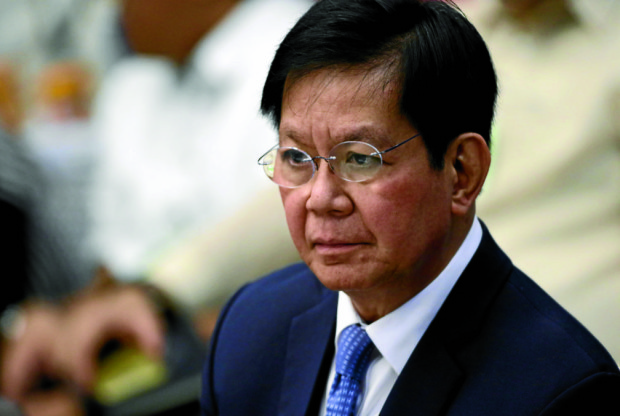Senators, PNP want wiretap law amended
Participants in a Senate hearing on Thursday agreed to put more teeth to President Duterte’s war on illegal drugs by pushing for amendments to the outdated Anti-Wiretapping Law.
Led by the committee on public order and dangerous drugs, several senators, justice officials and the police leadership expressed support for amendments to the law that would allow authorities to intercept communications of those suspected to be involved in the drug trade.
“The coverage of the Anti-Wiretapping Act is only the old crimes like sedition, espionage, rebellion, inciting to sedition,” said Sen. Panfilo Lacson. “But technology has modernized. And what was only covered before were landlines,” said Lacson, the committee chair.
“Now, [technology] has evolved to include data, transmission of data, electronic communication. So that has to be covered, and we also have to expand the coverage to include illegal drugs, plunder and the other crimes not included [in the exemption],” Lacson told reporters after the three-hour hearing.
The Anti-Wiretapping Law of 1965 was enacted to protect privacy of communication, penalizing the act of secretly intercepting, listening to and recording private conversations.
Article continues after this advertisementSection 3 of the law, however, grants an exemption and allows wiretapping of communication “in cases involving the crimes of treason, espionage, provoking war and disloyalty in case of war, piracy, mutiny in the high seas, rebellion, conspiracy and proposal to commit rebellion, inciting to rebellion, sedition, conspiracy to commit sedition, inciting to sedition, kidnapping as defined by the Revised Penal Code, and violations of Commonwealth Act No. 616, punishing espionage and other offenses against national security.”
Article continues after this advertisementUnder the law, such interception shall be covered by a court order.
4 bills
Four separate bills, authored by Senators Gregorio Honasan II, Grace Poe, Juan Edgardo Angara, and Lacson, would amend this section of the law to include violations of the 2002 antidrug law among covered crimes.
Honasan, a former Army colonel, cited how the Duterte administration presented an opportune “political window” to pursue drug suspects, as he recalled challenges that the likes of himself and Lacson, a former Philippine National Police chief, faced in pursuing those involved in the trade within prevailing legal limits.
“I don’t know when this political window will happen again. I and Senator Lacson envy you because there is a political leadership telling you to ‘do your job and I will assume responsibility,’” Honasan said during the hearing, attended by Justice Secretary Vitaliano Aguirre II and PNP Director General Ronald dela Rosa.
He said wiretapping was necessary “to ensure conviction” and remove “bottlenecks” on drug cases in the judiciary.
High time
“Given the magnitude of the country’s drug problem, it is time to legalize wiretapping in order to expedite the arrest of those involved in drug syndicates,” said Angara, who was unable to attend but issued a statement to support the move.
Through wiretapping, Angara said, the police would be able to pinpoint who are indeed involved in the drug trade, especially those in government and use wiretapped conversations as evidence. But he stressed, “Proper safeguards must be put in place to protect the rights of every Filipino.”
Senate Majority Leader Vicente Sotto III, former chief of the Dangerous Drugs Board, said the amendment was “highly imperative” to allow authorities to pin down big-time drug dealers. “Remember, it’s difficult to catch them red-handed,” he said.
Sotto pointed out the low conviction rate of drug suspects due to poor evidence. Based on Department of Justice figures, of the 126,016 drug cases filed under the previous administration, the state had scored only 3,482 convictions.
Aguirre said the court should allow wiretapping when police establish the case “above mere suspicion,” not necessarily just in cases where there is already probable cause against drug suspects.
Healthy balance
Dela Rosa later told reporters: “If we are granted by the court permission to wiretap, then you will just be sitting pretty there listening to their conversation … Then if you get the good part of their conversation then boom! Bingo! That drug lord is dead.”
Although Dela Rosa said during the hearing that the PNP did not have a wiretapping capability, Lacson disputed this.
He said the PNP had such equipment even when he headed the force, but that he understood Dela Rosa’s reluctance to admit this, saying it was a sensitive issue.
Sen. Leila de Lima said there should be a “healthy balance” between respect for privacy and law enforcement.
“We cannot just look at the one-sided track that, in our zeal to enhance law enforcement capabilities, we forget to respect rights, especially the right to privacy even when there is no legitimate purpose in using wiretapping,” said De Lima, who slammed during the hearing police and justice officials who she said were tapping her phones.
De Lima has been accused by President Duterte of protecting drug lords, a charge she has denied.
